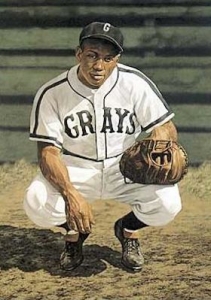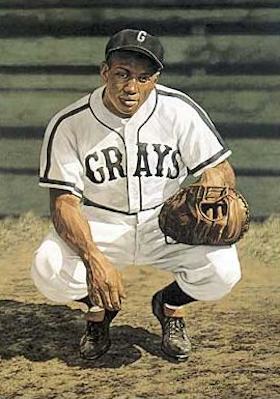September 26, 1943: Josh Gibson, Cool Papa Bell, and Buck Leonard lead Homestead Grays in Game 4
 A crowd of 6,000 turned out to Comiskey Park on September 26, 1943, at 2:30 P.M. for Game Four of the Negro League World Series between the Homestead Grays of the Negro National League and the Birmingham Black Barons of the Negro American League. The previous three games had been played in Washington, D.C., Homestead’s home park, a 4-2 Birmingham win; Baltimore, a 5-5 tie; and in Washington again, where the Grays pulled out a 4-3 win. The remainder of the Series would be played in Columbus, Ohio, Indianapolis, Birmingham, and Montgomery, Alabama. Birmingham had defeated Chicago in a playoff series for the NAL, after Birmingham won the first half of the season and Chicago the second half. Winfield Welch’s Birmingham squad was 51-42-2 overall, while Candy Jim Taylor’s Homestead team easily won the NNL by 17 games over the New York Cubans, finishing 53-14-1.
A crowd of 6,000 turned out to Comiskey Park on September 26, 1943, at 2:30 P.M. for Game Four of the Negro League World Series between the Homestead Grays of the Negro National League and the Birmingham Black Barons of the Negro American League. The previous three games had been played in Washington, D.C., Homestead’s home park, a 4-2 Birmingham win; Baltimore, a 5-5 tie; and in Washington again, where the Grays pulled out a 4-3 win. The remainder of the Series would be played in Columbus, Ohio, Indianapolis, Birmingham, and Montgomery, Alabama. Birmingham had defeated Chicago in a playoff series for the NAL, after Birmingham won the first half of the season and Chicago the second half. Winfield Welch’s Birmingham squad was 51-42-2 overall, while Candy Jim Taylor’s Homestead team easily won the NNL by 17 games over the New York Cubans, finishing 53-14-1.
Johnny Wright, with a NNL-best 20-4 record and a 2.33 ERA, took the mound for the Grays. Gready McKinnis (3-8) was his Birmingham opponent.
The Grays got on the scoreboard in the second inning. Josh Gibson, who had a monstrous year, batting .442/.541/.806, a league-leading 20 home runs, and 112 RBIs, walked. Howard Easterling doubled to left, sending Gibson to third. After a popout, Tommy Sampson knocked down a Jud Wilson grounder and threw him out, but Gibson scored for a 1-0 lead.
In the third, speedster Jerry Benjamin doubled and scored on Buck Leonard’s triple, giving the Grays a 2-0 advantage.
Cool Papa Bell led off the fourth with a single. McKinnis fumbled Benjamin’s bunt, and both runners were safe. Leonard dragged a bunt single and the bases were loaded. A fly ball by Gibson brought in Bell and the Grays had a 3-0 lead.
Bell made a great defensive play for the Grays in the bottom of the third when he speared a drive off the bat of Felix McLaurin and doubled off Ted “Double Duty” Radcliffe, who had ventured well off second base. The amazing catch “seemed to change the complexion of the entire game,” wrote the Pittsburgh Courier.1
Radcliffe gave new meaning to his “Double Duty” nickname. He was the manager and catcher for Chicago of the Negro American League. Paul Hardy, Birmingham’s regular catcher, was drafted into the US Army at the end of the season. Birmingham sought out Radcliffe to take his place, and the Grays granted permission. Wendell Smith of the Pittsburgh Courier cried foul over the entire process, and used the incident to push his belief in the need for a Negro League commissioner. “Despite the fact that the Grays approved the move,” he wrote, “there is no justification for it. According to baseball rules, the Homestead Grays won the series when the first ball was thrown in the first game in Washington, D.C., because Birmingham was using an ineligible player.” Since the Grays allowed the move, Smith sarcastically remarked, “[T]o hell with the rules and regulations.”2
John Huber came in to pitch for Birmingham in the sixth, and the fireworks were just starting. Jud Wilson hit a slow grounder to Leonard Lindsay at first, but his throw was low to Huber covering the bag. Vic Harris drew a walk, and Wright beat out a bunt to load the bases. Bell doubled down the left-field line. Wilson and Harris scored. Wright scored on Benjamin’s groundout. Leonard was intentionally walked to load the bases, and a single by Gibson scored Bell to make the score 7-0. Easterling singled, driving in Leonard. Matt Carlisle, who entered the game after Sam Bankhead was injured in a collision at second base with Piper Davis, grounded out, but another run scored, and the Grays led 9-0. Their six runs in the sixth blew the game wide open.
Wright allowed Birmingham only five hits and struck out two while walking six in the complete-game victory. Bell was the hitting star, going 3-for-5.
Cumberland Posey, the Negro League legend and owner of the Grays, writing in the Pittsburgh Courier, described the logistical problems in the Series. Negro League clubs did not own their own ballparks and often had to fit their schedules around the schedules of the white baseball clubs. The Series might have been played solely in the Midwest had it not been for Clark Griffith rearranging already scheduled games to fit the Negro League games in at Griffith Stadium in Washington.3
The Black Barons tied the Series with an 11-8 win in Game Five, but Wright threw a second shutout on September 29 in Game Six, winning 8-0. Playing Game Seven at home, Birmingham squeaked out a 1-0 win in 11 innings, and the Series was tied again. Homestead took the Game Eight clincher, 8-4. The Series left a bad taste in the mouths of fans. The final game was scheduled for October 10 in New Orleans. Wendell Smith was told several players had to report to their draft boards in the middle of the week, so the game was switched to Montgomery on October 5. Hayward Jackson, also of the Courier, believed it was a matter of poor communication. In either case, a highly publicized game that would likely have had a large crowd became a much smaller affair in Montgomery. “I wonder how long the men who are responsible for Negro baseball will continue to boot the public around and do as they please,” Smith railed. “The entire promotion of the World Series was a farce.”4
Management issues, however, have retreated into the shadows of time, and the sunset of the Negro Leagues themselves would soon descend. But for those at Comiskey Park on September 26, they saw five stars who would become Hall of Famers (Bell, Ray Brown, Gibson, Leonard, and Wilson) when the color of their skin was no longer an excuse to disregard their greatness.
Sources
Negro Leagues Database. https://seamheads.com/NegroLgs/index.php.
“Sox Park Is Site of Negro Game Today,” Chicago Tribune, September 26, 1943: 34.
Staff Correspondent. “Wright Hurls 5-Hitter to Blank Birmingham,” Afro-American, October 2, 1943: 18.
Notes
1 “Barons Shut Out in Game at Chi,” Pittsburgh Courier, October 2, 1943: 16.
2 Wendell Smith, “ ‘Smitty’s Sports Spurts,” Pittsburgh Courier, October 2, 1943: 16.
3 Cum Posey, “Posey’s Points,” Pittsburgh Courier, October 2, 1943: 16.
4 Wendell Smith, “ ‘Smitty’s Sports Spurts,” Pittsburgh Courier, October 16, 1943: 16; Hayward Jackson, “New Orleans Fans Score Cancellation of Series Game,” Pittsburgh Courier, October 16, 1943: 16.
Additional Stats
Homestead Grays 9
Birmingham Black Barons 0
Game 4, Negro League World Series
Comiskey Park
Chicago, IL
Box Score + PBP:
Corrections? Additions?
If you can help us improve this game story, contact us.


